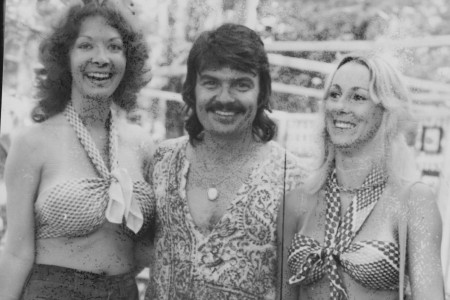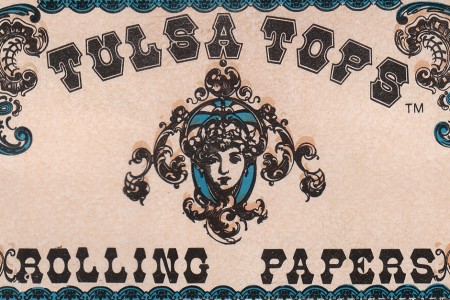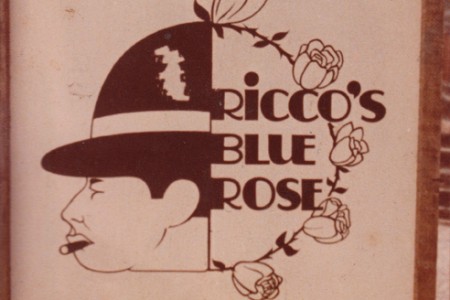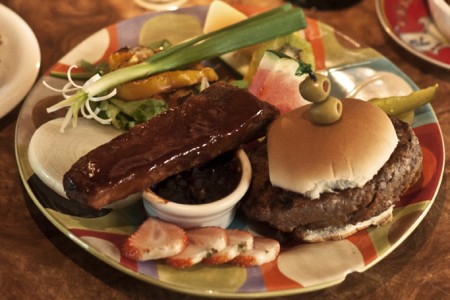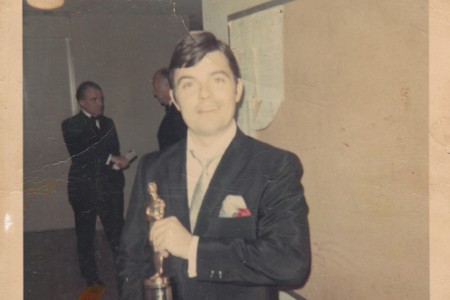J.J. Conley lounges against the cushions of a private room at Lucky’s. He studies his glass of Syrah and takes a sip. He is a smallish man, elegantly dressed, looking something like an aging GQ model. He isn’t the scruffy commoner you would expect to be running a burger joint. But Conley’s is not a common burger joint–for decades it has been a curious, almost intimidating place to eat.
J.J.’s Gourmet Burger Café is a pure reflection of its owner. Loaded with bravado, rules and charm, the entire place exposes his soul. Yet J.J. would disagree with you. It is his way.
“Naïve people believe just about anything,” Conley says, adding, “Good lies make good stories.”
NEFARIOUS BEGINNINGS
Born Jerry James Conley to a German immigrant who never quite had his adoption papers in order, J.J. had the paternally-invented last name of Conley. It was a non-issue until he was scrutinized by the F.B.I for clearance to work with sensitive information as a defense airman. A hasty call to dad revealed the truth that papa had hoped “would never become an issue.” Hansberger was his real last name. The feds frowned but gave J.J. a choice of last names. His choice would settle the issue. Keeping the name given to him in a Tulsa hospital years ago, he remained a Conley.
The Tulsa Public Schools system in the 1950s was under attack by two young students who, admittedly, were keen to have the attention of the class through look-at-me antics. According to Conley, future actor Gailard Sartain and he were in constant trouble. By their 7th grade, the administration had had enough. With a touch of mischievous humor, J.J. claimed that the two were “possibly responsible for numerous teacher resignations and we were idiots, (who) couldn’t read, couldn’t write. They told our parents they did not care what was done with us except to find a new school system and not put us in the same school.”
As a result, Sartain enrolled at Cascia Hall while Conley was admitted to the Oklahoma Military Academy. J.J. explains, “I was going to become an officer, and he was going to be a Catholic.”
“I’ve known Jerry for what seems like an eon,” reports Sartain. He recalled J.J.’s “flair for the things that shouldn’t be done in civilized society.
“Yes, I was a willing accomplice in some nefarious endeavors,” he adds. “Wonderful memories.”
Joining the Army and eloping at 17 with his 18-year-old girlfriend was a jolt to J.J.’s parents.
“She could have been arrested,” Conley says. “I thought I was going to die in Vietnam. I thought at least she would get some money, but we barely lasted until boot camp. She fell in love with another guy and is still married to him.” J.J. headed to Vietnam for a tour of duty. After enduring enough hysteria to last a lifetime, Conley left the service and utilized his GI bill.
He attended three universities for short periods of time. After racing a motorcycle up and down the fourth floor of Cordell dormitory in Stillwater, Conley claims that the OSU President personally advised him that he was no longer welcome in Stillwater. UCLA is barely a memory, but Conley stayed at Loyola for a semester before becoming disenchanted with too many rules.
“I will be missing Vespers again,” he told his Catholic friends.
Conley decided to follow the footsteps of his grandpa and father who were master journeymen. His grandpa was the master carpenter at the San Francisco Opera House until he died. His grandma formed the first wardrobe union in California. Gaining his union card in the mid-60’s, J.J. became a master lighting technician working on numerous CBS TV shows like The Smothers Brothers, The Jonathon Winters Comedy Hour and many others. The union sent him to work the setup and lighting board for the Joffrey Ballet, the 1968 Academy Awards, as well as working the nightclub shows of numerous big name entertainers like the Four Seasons and the presidential campaign of Hubert Humphrey.
FREE LOVE AND PROFITABLE PAPERS
Rubbing elbows with scores of Hollywood types, led J.J. to Topanga Canyon’s 8 acre Elysian Fields, a hippie nudist colony that lasted through 2001. According to Roman and Greek mythology, Elysian Fields was the final resting place of the souls of the heroic and virtuous. For Conley, it could be said that his association with the clothing-optional people of the Elysian fields smacked him with high adventure, Sixties freedoms and high times. A little bit of Heaven and a little bit more of Hell.
Along with his high-rolling LA compatriots, J.J. headed for decadent escapades in Spain and France. This band of beautiful people draped with gold chains, expensive sunglasses and great tans took to the streets of Pamplona, home of the stampeding bulls. Plied with nasty Fume de Toro brandy and other ingestible contraband, J.J. found himself on a mission to extricate a travel mate from the boarded up, no-way-out corridor that would soon contain the thundering herd of beasts. When he reached his compadre, J.J. tried to reason with him, saying, “let’s do this another day.”
Too late. The cannon noise ricocheted down the cobbled streets loud as a thunderclap. The hoofed mob would soon be upon them. Crouched in a doorway, clutching the wood with a desperate embrace, they survived the cacophony of snorts and screams. Finally, they were the only two left on that section of the street. Laughing, breathing heavily, safe. But they were unaware of the format. No one had shown them the rulebook.
Once the bulls reach the ring, they are released to careen back up the street only to be taunted with rolled up newspapers and red colored fabrics. The tired bulls drunk with rage and the tormentors drunk with spirits confronted each other once more. J.J. joined others in the forbidden challenge of climbing aboard a confused, marauding creature. Battered, bleeding and spotted with excrement, the bulls proved nonnegotiable. The good news was the badges of blood and stool that soiled his clothing entitled J.J. to a night of free drinks before leaving for France.
Elysium Institute’s membership in the American Sunbathing Association gave them a free pass to over 200 domestic au naturale resorts in Europe. While in France, they soaked up the sunshine at the largest facility in the country. By the second day they had already overstayed their welcome. They were bid adieu for introducing the clientele to the pleasures of psychedelics and mingling with too many of the mademoiselles.
Conley returned to California clothed and careered. In the days to come, he would find it difficult to leave the Hollywood lifestyle, the house overlooking Ventura Boulevard and meeting a new somebody every day. However, the letters from Tulsa kept urging him home. He grew weary of the arrogance of the show business stars.
“When the blue spot is turned off they are nothing,” he says.
In 1973 he returned home. He rented an old house at 7th and Peoria and brought a little “Bohemia back to Tulsa.” The result was a shop called the Rubicon that sold California-style jewelry and beads as well as head shop materials like rolling papers.
Recognizing a need for wider rolling papers (for tobacco and such), J.J. created Tulsa Tops papers. They were 1.5 times wider and could be used in a rolling machine or rolled by hand. After gaining a trademark in New York, they became a national winner, beating EZ Wider and all the other big boys. He eventually sold the paper rights to a tobacco company.
RICCO’S BLUE ROSE
Recalling a quote from an LA acquaintance, comedian Lenny Bruce, who said, “There is nothing sadder than an old hipster,” Conley determined he was getting too old to be a hippie. In 1983, he sold all the Rubicon fixtures and converted the space to The Dragon’s Tree restaurant that, according to its matchbook cover, provided “spirits, pleasure and cuisine.” This short-lived effort made way for a highly successful speakeasy.
Named Ricco’s Blue Rose, this low-profile bar enjoyed immense success during Oklahoma’s drink-by-the-wink era of illegal alcohol sales. An Edgar G. Robinson logo replete with tipped hat and a blue rose adorned the Ricco business card. When a gangster dies, the tradition was to send a blue rose. This edgy symbol got the tongues wagging. Business went from good to great.
“If my reputation got bad, I enhanced it. The more wicked you are, the more they want to come,” J.J. says after another pull on his vino. “Naïve people believe just about anything. I am not selling drugs. I am selling liquor illegally, but we are just having fun.” Getting into Ricco’s was part of the intrigue.
The parking lot was in back. The front door was locked and the back door was electronically switched with video camera surveillance. Entrance was granted by flashing your blue, hard plastic membership card to the camera before a security person would permit access. Lacking a card, a pretty woman was seldom turned away. Just inside the door, an attention-getting sign requested that you “ unload your gun and take off your ski mask before entering.” Another let you know that once you leave, you can’t come back in. You stay in or you stay out.
Inside were the beautiful people. Prominent lawyers, doctors, executives and “only the prettiest women” were allowed into the joint. Many were Vietnam vets. They were a pretty tight group. He never felt a need to carry a gun and there was never a fight.
Ricco’s was not a large facility. The main floor had two small bar tops and comfortable furniture. The walls still contain photos and messages from the many movie stars that J.J. cavorted with or admired: John Wayne, Dean Martin and the Lone Ranger, for example. This was the “medicinal era” so it would not have been surprising if someone had a gram of cocaine or some disco biscuits in his pocket. Yet, drugs were not pedaled there.
The police were suspicious. There had to be something illegal going on there. A vice cop ambled into the bar one sunny afternoon. He asked J.J. if he minded a little inspection. Told he had the run of the house, the uniformed man searched every room, every inch of the basement before heading to the second floor with hopes of a damning violation. The highlight of the tour for J.J. was the cop assuming an aggressive stance before throwing open the second floor bathroom door as if there would be criminals hiding inside. The news report said the police investigation was complete and no drug activity was uncovered.
The story spread across the city’s newspapers and news at 10. The police received some heat from the public that they must have been too shallow in their investigation. There must be something going on at Ricco’s. J.J. just let the story build. People clamored to become part of the scene. The cost of membership cards permitting the purchase of alcoholic drinks just went up.
Initially, the VIP membership cards at Ricco’s were a few dollars, then $5, then $20 and finally topping out in the hundreds. When asked what he learned about the success of the rapidly escalating membership fees, Conley responded, “One born every minute. Did not matter what I charged, they just kept on coming.”
THE BIRTH OF JJ’S GOURMET BURGER
Then liquor became legal. J.J. quit the business immediately, saying, “Well, this is no fun now!” So he reinvented himself, again, this time as a restaurant. Hoping to “cultivate some culture,” he served flaming escargot, steaks and other high-end foods. It did not take long before he pared this down to today’s gourmet burger. Now many Tulsa high-end restaurants have such an offering, but J.J. always makes sure his is the most expensive.
His mostly rib eye with a little chuck to hold-it-together burgers were the first gourmet hamburgers in Tulsa. The starter has shrimp and several vegetable pieces in a delicious sticky seeded dressing and various nibble-size crackers. The main course is, of course, the succulent burger, but wait, there is more: a cup of sweet baked beans, one perfectly smoked rib, thinly sliced cucumber, cantaloupe… and more. The final experience is a decadent chocolate brownie with walnuts and cappuccino. But take heed regarding the ordering process or you will be rebuffed, although very politely.
Let’s back up. On a small entry table rests a placard that tells you to be prepared to show your membership card. What? The card can be procured at the conclusion of your first dining experience. Not before. Maybe not at all.
This is J.J.’s domain. It is an autocracy. Remember that he is the Burger Nazi, and you will go far. If customers stroll in with bad hygiene, random piercings, loads of tattoos, tank tops or other offensive manner of dress, they will be asked for their membership card. Since they do not have one, they are reminded this is a members-only burger café. Mystified by the announcement, they stumble out into the street, hungry. On the way out, there is the sign that says, “Take this man to McDonalds. They have crayons there.”
Further, it is important to understand his business plan. The café is open Monday – Thursday, 11-1 only. There was a limit of 50 burger presentations each day, but that has been reduced to 25. It was just too busy. Once sold, the kingdom closes for the day. Also, no credit cards or checks. In addition, don’t ask to split an order with your spouse or request the burger to be cooked to your preferred doneness. No chance on either. Those and similar requests will get this smiling response, “you know, right up there at 15th and Peoria are several places that will cook and serve your meal any way you want.” The arrogant, standoffish attitude is a hook. It works.
In 1980, J.J. ended phone service to the café. Around 1990 there was a glowing article in the Tulsa World about J.J.’s Gourmet Burger Café. The response was incredible. Patrons were lined up out the door and down the sidewalk. Conley reacted by closing for a week hoping they would all go away and reduced his parking lot by half. Smiling, J.J. declares, “I have done everything I can to slow business down, and it has not worked.”
“Occasionally some Gomer comes in here and wants me to burn up his burger. I just won’t do it. Gomer tells me, ‘that’s bad fur yer bidness.’ I tell him, ‘works for me.’ The criticism is just the price you pay for glory.”
CLOTHESHORSE
The sole server is J.J. Himself, and his long-time friend and employee, Bernie Burt, handles the cooking chores. He takes your order or delivers his pronouncements of no-can-do dressed very smartly. Conley is a clotheshorse. He recalls the day when people would wear a tie to go to the Will Rogers Theatre to watch a film. Presumably, both he and Sartain took off their fancy duds before digging tunnels in Conley’s backyard as they re-enacted every action movie shown at the theater situated just across the street.
Las Vegas dealers used to wear tuxedos, now they wear parachute pants and flip-flops. J.J. won’t go.
“I can dress casually,” he says, “but if I go out or go to somebody else’s place, I don’t want to embarrass them.”
He started out with the button-down, Ivy League style, and just stuck with it.
“I am never going to wear a JC Penny blazer and wing tips again. So I over-do it. So what? It is my only Jones. I don’t bowl, have kids or chase women. All I have is me, so if me wants to dress nice, it is quite a bit less expensive than other habits.”
He used to play golf but now there are just a bunch of poorly-dressed guys playing instead of smartly-dressed business types. So he nailed his Ping clubs to the restaurant wall. People comment on how nice they are. Conley tells them, “I want to cut them up and throw them away.” It just drives them crazy.
For years, J.J. has ordered all his clothes online. He likes the English style including the watch fob and other gold chains. Conley is a huge fan of Italian suits with angled /Hacking suit pockets and split vents.
“Anyway,” he laments, “they don’t make my size (for regular retail). I’m a dwarf!” But he looks good.
He looks good all the way to the bank as well. Conley says he’ll never change the business again. It’s too good and everybody likes it.
“I’ll just stay with it,” he says.
Steve Gerkin DDS, CSW is a wine-educator, co-owner and winemaker for Twin Feathers Winery and adjunct professor for the Hotel and Restaurant Administration department of Oklahoma State University in Stillwater, Oklahoma.

